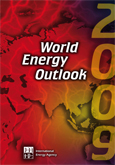IEA: Recession offers opportunity to save the planet
 Global carbon emissions expected to fall three per cent this year, providing leaders with window of opportunity to deliver transition to clean energy
Global carbon emissions expected to fall three per cent this year, providing leaders with window of opportunity to deliver transition to clean energyThe global economic downturn has resulted in steep cuts in carbon emissions and has led to the deferral of many carbon-intensive investments, providing world leaders with a unique opportunity to accelerate the transition to a low-carbon economy.
That is the conclusion of a new report from the International Energy Agency
(IEA) released today at the UN’s latest round of climate talks in Bangkok –
intended to help break the negotiating deadlock that has stalled efforts to
agree a successor to the Kyoto Protocol.
The report, a special
early excerpt of
the annual World Energy Outlook, the full version of which will be published
in November, predicts that the economic downturn means carbon emissions could
fall three per cent during 2009 – the steepest fall in the past 40 years.
As a result, emissions in 2020 will be five per cent lower than originally
anticipated, providing world leaders with an unexpected window of opportunity in
which to stabilise emissions at levels that should ensure dangerous levels of
climate change are avoided.
Speaking to negotiators at the UN conference in Bangkok earlier today, IEA
executive director Nobuo Tanaka said that the downturn "gives us a chance to
make real progress towards a clean-energy future, but only if the right policies
are put in place promptly".
The IEA report maps out a scenario where the global energy infrastructure
can be transformed to ensure that concentrations of carbon dioxide in the
atmosphere stabilise at 450 parts per million (ppm), and concludes that it can
be achieved at virtually no net cost to the global economy.
The report sets out a series of policies for countries at different stages of
development that would see fossil fuel use peak before 2020. It argues that
industrialised countries should slash energy related emission 17 per cent by
2020, while emerging economies should limit the increase in their emissions to
14 per cent above current levels.
It also calls for a huge increase in the use of low-carbon energy sources,
advocating a threefold expansion in nuclear capacity, a fourfold increase in
renewable energy and a 14-fold increase in clean coal energy by 2030.
The IEA puts the cost of its 450ppm scenario at $10 trillion (£6.27 trillion)
between 2010 and 2030, but predicts that the cost will be all but offset by
improvements in energy efficiency and reductions in air pollution even before
the economic benefits of addressing climate change are considered.
"The biggest challenge will be to ensure there is funding to back this energy
transformation, with substantial support for developing countries," admitted
Tanaka, estimating that by 2020 the energy sector in poorer nations would need
to make $200bn of extra clean technology investments each year, while richer
nations will have to invest an additional $215bn a year by the same date.
"But the benefits, in terms of energy savings, reduced fuel imports and
air-quality improvements offset much of this extra cost, not to mention the fact
that this will help to avoid extreme climate change."
Tanaka stressed that there was a strong economic case for increasing
investment in clean technology as early as possible, explaining that "every year
of delay adds an extra $500bn to the investment needed between 2010 and 2030 in
the energy sector".
The report comes as negotiators become increasingly desperate in their
efforts to break the deadlock that has come to dominate the talks.
Yesterday, China and the G77 group of developing countries took the unusual
step of
publicly
accusing rich nations of attempting to "sabotage" the entire Copenhagen
negotiating process by proposing fundamental changes to the Kyoto framework that
would effectively scrap the need to sign up to binding emission targets.
You can return to the main Market News page, or press the Back button on your browser.

